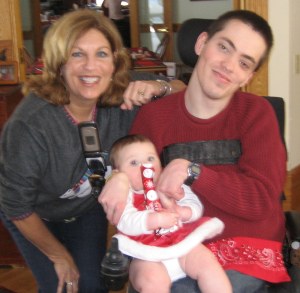 “Close your eyes and think of nothing,” the psychology teacher instructs.
“Close your eyes and think of nothing,” the psychology teacher instructs.
“Nothing?” several of the high school students ask. An air of festivity surrounds the classroom. This is supposed to be a difficult course. The teacher is known for being very serious about his subject, giving tough tests and even tougher reading assignments. Yet here he is, telling them to close their eyes and think of nothing.
Easy, right?
The disabled student I tutor in the classroom gazes at me with his crooked grin, a light lit from within. He’s a good student, despite his severe disabilities from cerebral palsy, and he pushes himself in every class for A’s or B’s, struggling valiantly despite the fact that he can’t read or write. His eyes roam too much for such focus; his tutors tape all of his reading and homework assignments.
I close my eyes with the rest of the class and imagine thinking of nothing. Blurred lights move underneath my closed eyelids, which I try to ignore as I attempt to close down my mind.
move underneath my closed eyelids, which I try to ignore as I attempt to close down my mind.
It’s hot in the room. Indian summer. The leaves are still green and happy, as though oblivious to their impending doom. Nothing. Do leaves end in nothingness? Well, no. Their crunch underfoot leads to a sodden mess once the November rains begin, and then they decompose into mulch to aid the fresh sprouts that begin in spring.
But I am thinking of fall and spring, of death and life, and I’m supposed to be thinking of nothing.
“Mrs. Wight. Mrs. Wight!” my student calls me in a staged whisper, and I open one eye, then the next, seeing him wave his frozen arms toward me as he sits in his motorized wheelchair.
“Yes?” I whisper back.
“Can you close my eyelids? I can’t.” He says it matter-of-factly, and at first I don’t understand. I’ve gotten used to the fact that he can’t walk or watch a movie or go to the bathroom by himself, but the thought of going to bed every night without being able to close his eyes burns my chest with anguish. I gulp, not allowing him to see my distress, and reach over to close his eyes.
I touch his eyelids gently, lovingly, and wonder how this 16-year-old puts up with a middle-aged woman like me, following him along to every class, writing his words as he dictates his homework, closing his eyelids as he thinks of nothing.
He smiles his thanks, and I watch him swallow hard, trying desperately to think of nothing. I keep my mouth shut, not letting him know it’s impossible. As my arm muscles twitch from fatigue, held aloft, softly keeping my student’s eyes closed, I think of a Paul Valéry quote I learned from a psychology teacher in my college days:
“God made everything out of nothing, but the nothingness shows through.”
Back then we discussed Valery’s meaning ad nauseum, the existential students agreeing that life was empty and meaningless, the idealists arguing that God filled the nothingness with light and hope.
As I watch my student struggle, eyes roving like a machine underneath my fingers, I realize the truth: nothing does not exist. Each of us is full of everything.
I let go of his eyes and he looks at me in surprise as I shrug and laugh. Then he exclaims to his fellow students: “Nothing is impossible!”

One of your best blogs yet – and that is saying a lot as the others are hard to beat!
LikeLike
Thanks Barb. I’m just trying to BECOME all I can become. Wink Wink
LikeLike
Very touching. It’s amazing how much effort someone so disabled is prepared to put in despite the disabilities. More amazing how muh he ccan achieve with a little gentle help.
xxx Massive Hugs xxx
LikeLike
That’s why I’ve been so lucky to work with such a special young man . Makes us realize how much we can do with just a lot of effort…and belief… and support…and of course, love.
LikeLike
Wonderful, Pam! What an amazing young man and how lucky he was to have you!
LikeLike
I was the lucky one!! xo
LikeLike
I’ve tried it a few times … to think of nothing. Can’t be done, not by me. I can’t turn it off. Even when I’m settling down for the night … so many thoughts!
LikeLike
I don’t think our brains are wired to think of nothing…
LikeLike
Sigh
Like the rest of us, your student is fortunate to have known you. Great piece of writing. Safe journey.
LikeLike
YOU make me feel like I can handle the journey – and thrive. THANKS.
LikeLike
Wow. Great lesson for today, Pam. Thank you!
LikeLike
I have thanked my student so many times. He just shrugs, not realizing how many he inspires.
LikeLiked by 1 person
I have tried this as well, and I agree it is impossible, for me anyhow. There are always words in my mind, including ‘stop thinking’. 🙂 I agree with your marvellous student, Nothing is impossible.
LikeLike
Don’t you love it? And “impossible” is definitely not in his vocabulary.
LikeLike
nothing for me, is a specific thing/entity, it has substance and boundaries just like everything else!
LikeLike
Ahhh, interesting way to think of ‘nothing.’ Thanks for the insight.
LikeLike
Isn’t that something. I can’t close my eyes and think of nothing either.
Your young student sounds a delightful young man. He’s lucky to have you. ❤
This is an inspirational post.
LikeLike
He has amazed me every day. And maybe the MOST amazing thing about him is his laugh!!
LikeLike
A precious and lasting story told by a kind and generous person.
LikeLike
Merci! And mercy, I’d love this story to be lasting in the sense of opening our senses to those ‘different’ from us who have so much to offer. Too many times I see people avert their eyes away from my student, as if a disability is something to turn away from. I have enjoyed watching my student’s distain toward that ignorance.
LikeLike
What a lovely sentence: ‘nothing is impossible’. I love the double meaning it has. Your student sounds amazing and your post brightened up my day. Thank you!
LikeLike
My student’s intelligence and intuition inspire me and those around him. Thanks so much for stopping by and commenting.
LikeLike
Right he was; nothing is impossible. And learning about him gives that statement the biggest double meaning I have heard or seen in a very long time. Thank you for allowing us to meet him.
LikeLike
I’ve always felt conflicted about how much to share about my student, wanting to keep his privacy, but also wanting to share his amazing attitude and strength. Thank you for the encouragement!
LikeLike
Another touching post. What a great young man and how much he must appreciate your help. Sometimes, when you let go of all thoughts, everything is bathed in light and becomes peaceful.
LikeLike
You are so RIGHT about the light and the peace. Meditation helps with that, but I find I need to put my thoughts in a cloud and let them hang there, unattended. 🙂
LikeLike
What a great idea, putting one thoughts in a cloud, I ‘ll add my worries to that.
LikeLike
I am humbled yet again by thinking of something so simple we take for granted, like closing our eyes. Thank you for sharing such a sweet encounter with your student. It truly is impossible to think of nothing (for me) but “they” say men do it all the time! LOL! btw…who are “they” and what do “they” know?? 🙂
LikeLike
Ha Ha! I find that “they” are often wrong. 🙂
LikeLike
Oh my gosh! What a story. I”m with you nothing does not exist.
LikeLike
Nothing, to me, is like the color black. A void, which eventually, in some way, is always filled.
LikeLike
I have closed my eyes and thought of nothing for long periods of time, at times. Yet perhaps the biggest “lesson” we can learn from that is what you realized and shared with us. Nothing is always full of everything! And, conversely, everything is always empty of anything that’s real. Perhaps if a person truly grokked these understandings we’d be completely at peace…
LikeLike
What I was TRYING to say was that being in that place of *no thought* isn’t a big deal. What’s a big deal is the realization you got out of it without even experiencing it. Errr…words…
LikeLike
Smiling! It is SO HARD to explain getting to that place of meditative emptiness (which I think is what you’re talking/writing about?). That the biggest lesson is in the ‘doing’ it (or trying to) and realizing how full up we are. Of nothing… and everything. xo
LikeLike
Love this!
LikeLike
Thank you! I love that you stopped by, read, and commented. Hugs.
LikeLike
This is such a lovely post, Pam! Well done 😀
LikeLike
Thanks so much!
LikeLike
nice Kindest Regards Harriet
________________________________
LikeLike